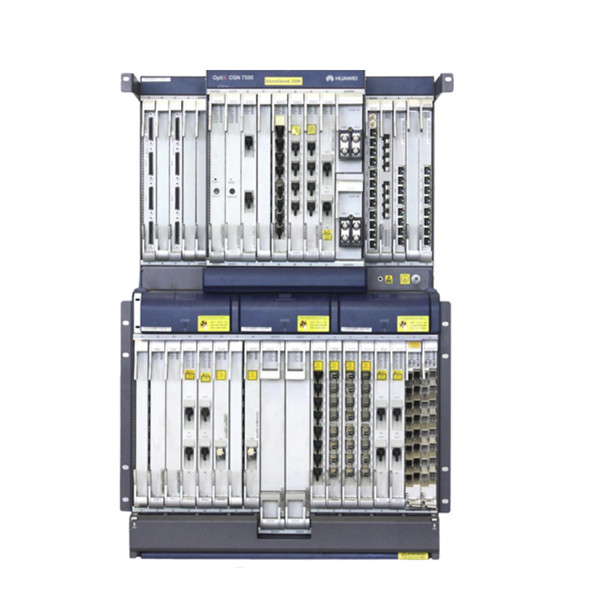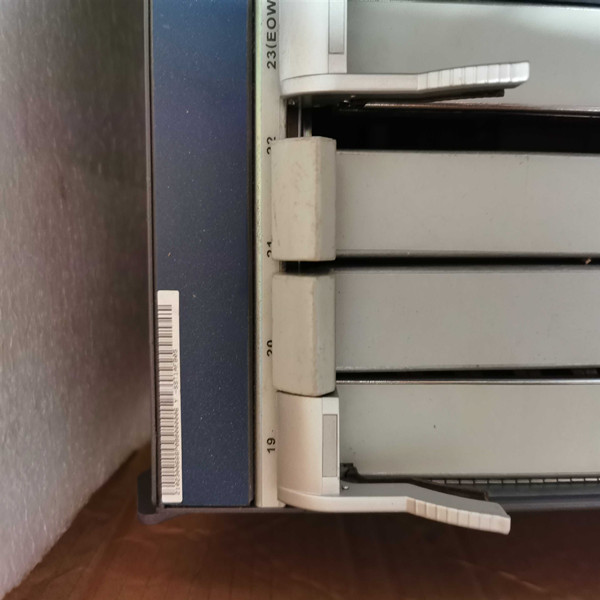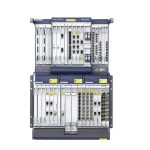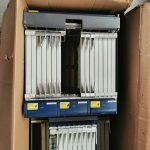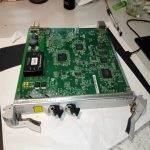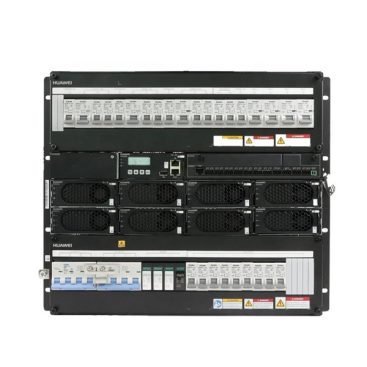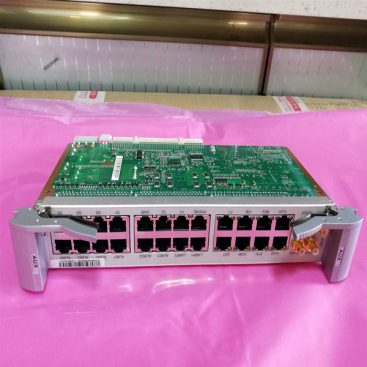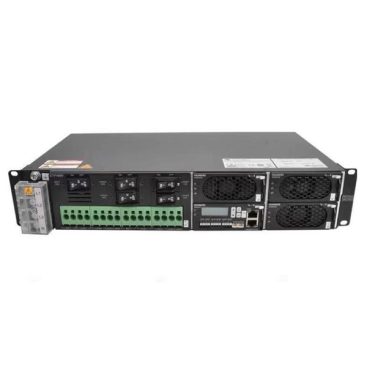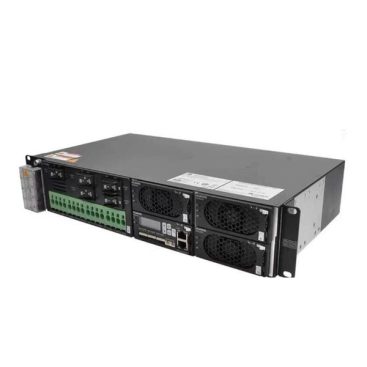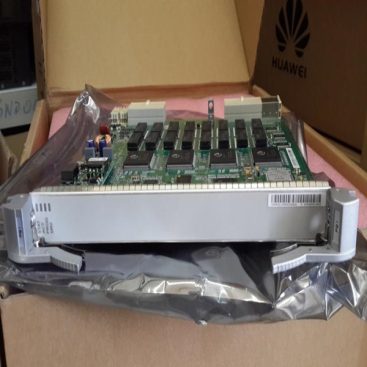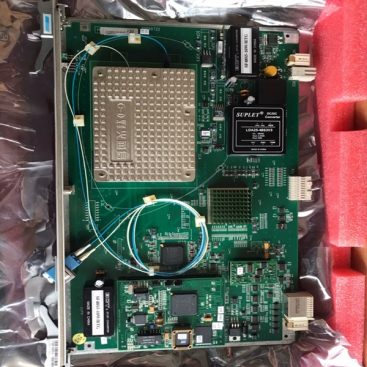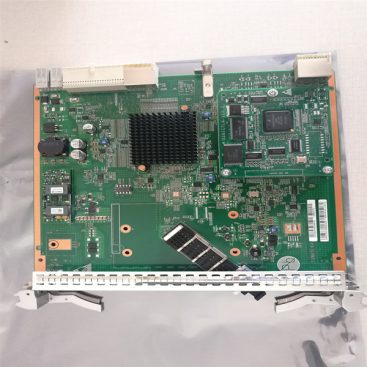- Descrizione
- Inchiesta
- Allegato
Descrizione
Huawei OSN7500 SDH is a new generation of core intelligent optical switching equipment developed by Huawei based on the current status and future development trends of the metropolitan area network. It is mainly applied to the business scheduling node of the metropolitan area network backbone layer, namely OCS (Optical Core Switching) equipment type.
Huawei OSN7500 SDH Product Overview
Come piattaforma di commutazione ottica intelligente e sistema di commutazione ottica principale,
Huawei OSN7500 SDH is positioned at the backbone layer of the metropolitan area network, and can complete multiple types and different granular business scheduling and transmission.
Huawei OSN7500 SDH adopts a unified switching architecture, which can be used as packet equipment and TDM equipment based on MPLS/MPLS-TP technology. With other Huawei equipment, OSN 7500 supports different networking applications: applicazioni in modalità pacchetto puro, applicazioni di rete ibride (modalità di raggruppamento e rete sovrapposta in modalità TDM) e applicazioni in modalità TDM pura per ottenere la migliore elaborazione dei servizi dati e dei tradizionali servizi SDH.
Nella modalità TDM, l'OSN 7500 has a large service crossover capacity, con un massimo di 360 Gbit/s crossover di ordine superiore e 40 Gbit/s crossover di ordine basso. In modalità pacchetto, la sua capacità di commutazione di pacchetto può raggiungere fino a 160 Gbit/s.
Huawei OSN7500 SDH Product Pictures
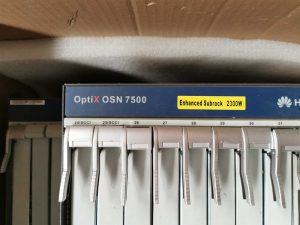
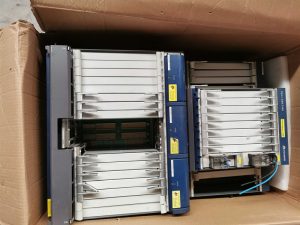

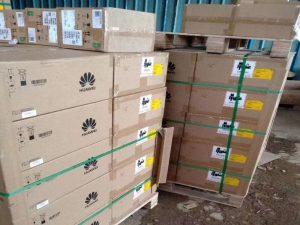
Huawei OSN7500 SDH Product Specifications
| Marca | HUAWEI |
| Modello | OSN7500 |
| Dimensioni | 757 mm (H) X 497 mm (W) X 295 mm (D) |
| Capacità di commutazione | Pacchetto: 160 Gbit/s e TDM: 360 Gbit/s (ordine superiore), 80 Gbit/s (ordine inferiore) |
| Slot di servizio | 22 slot per le schede di elaborazione e 8 slot per schede di interfaccia |
| Supported interfaces | UNO-3(40G, conforme allo standard OTL3.4) |
| FE/GE/10GE | |
| STM-1/4/16/64 | |
| E1/E3/E4/T1/T3 | |
| E1, STM-1 | |
| 40-channel DWDM interfaces, conforme a ITU-T G.694.1 | |
| 8-channel CWDM interfaces, conforme a ITU-T G.694.2 | |
| FXS/FXO, 2/4 audio via cavo ed E&M | |
| X.21/V.35/V.11/V.24/V.28, RS232/RS422, RS449/RS423A/RS422A, RS530/RS530A, RS485, G.703 64 kbit/s codirezionale | |
| DD, SAN, video | |
| Modalità di rete | Supporting pure packet, ibrido (pacchetto + SDH) o rete SDH |
| Supporta la rete WDM | |
| Supporta la trasmissione bidirezionale a fibra singola | |
| Alimentazione elettrica | -48V CC/-60 V CC; 110V CA/220 V CA (External module) |
| Operation Environment | Lungo termine: -0ºC ~ 45ºC |
| A breve termine: -5ºC ~ 55ºC | |
| Lungo termine: 5% ~ 85% | |
| A breve termine: 5% ~ 95% | |
| Funzionalità Ethernet | E-Line ed E-LAN, QinQ |
| VPWS e VPLS basati su MPLS-TP | |
| Pseudofilo multisezione (MS-PW) | |
| ETH PWE3, TDM PWE3, ATM/IMA PWE3 | |
| Snooping IGMP V2 | |
| Lista nera, Soppressione dei pacchetti broadcast, ACL | |
| SCAMBIO VLAN | |
| PCM features | Conferenza/riunione voce o dati,P2MP,MP2MP |
| La modalità FXO/FXS può essere impostata tramite software | |
| E&M La tensione dell'interfaccia può essere impostata tramite software (-48V/-12V) | |
| E&La segnalazione M può essere impostata tramite software (Tipi di campana I, II, III, IV, V e British Telecom SSDC5) | |
| QoS | Pianificazione gerarchica della QoS e modellamento del traffico |
| Modalità DiffServ basata sulla classificazione del traffico, otto code prioritarie | |
| Classificazione semplice del traffico, complessa classificazione del traffico, comportamento per hop (PHB),e ACL | |
| Tasso di accesso impegnato (AUTO), modellazione basata sulla priorità di pianificazione delle porte | |
| Priorità di pianificazione PQ, coda equa e ponderata (WFQ) e coda PQ+WFQ | |
| Caduta della coda e rilevamento precoce casuale ponderato (WRED) | |
| OAM | LSP/PW OAM: |
| CC, LIBBRE, LT | |
| AIS, RDI | |
| LM, DM | |
| LCK, TST | |
| QCS | |
| LSP/PW OAM: IDE, BDI,CV, FFD, TraceRoute, Ping, LM, DM | |
| PWOAM: CES PWVCCV | |
| ETH-CC, ETH-Loopback, Traccia del collegamento ETH, Loopback remoto, Rilevamento guasti remoto, RMON(RFC 2819) | |
| Protezione | Connessione incrociata 1+1 backup, pannello di controllo 1+1 backup e alimentazione 1+1 backup, orologio 1+1 backup |
| LSP/PW Protezione lineare, Protezione dell'anello | |
| Protezione anti multifailure basata su MS-PW | |
| RITARDO, MC-LAG, Protezione dual-homing, LPT | |
| 2/4 Anello in fibra MS-SP; | |
| 1+1/1:N (N<=14) MSP lineare | |
| SNCP/SNCMP/SNCTP | |
| 1:N tributary protection for E1/T1, E3/T3, E4, STM-1(e) e FE | |
| Protezione dal reindirizzamento ripristinabile distribuito | |
| 5-schema di protezione dedicata a livello di servizio basato su diversi SLA: Diamante, Oro, Argento, Servizi Rame e Ferro | |
| Basato sulla granularità VC-4 e VC-12 | |
| Sincronizzazione | Entrambe le reti Ethernet e SDH supportano la sincronizzazione dell'orologio |
| Supporta G.813, Sincronizzazione sincrona Ethernet e IEEE 1588v2 | |
| Recupero adattivo dell'orologio (ACR) | |
| Due ingressi/uscite clock esterni (2 MHz o 2 Mbit/s) | |
| Due segnali orari esterni(1pp+TOD) |
Huawei OSN7500 SDH Product Features
- “Unified switching” architettura, tenendo conto di più servizi: OSN7500 equipment adopts the “commutazione unificata” architecture to achieve unified scheduling of packet services and TDM services, e creare modalità applicative flessibili: modalità pacchetto puro, modalità TDM pura e modalità ibrida (pacchetto + TDM). The three modes can be expanded at the service board level to achieve smooth conversion, so as to always meet the development demands of operators’ business and network in the most suitable mode, and it is convenient for operators to make distributed and smooth investment in accordance with technological development and industrial chain maturity.
- Soluzione completa per la trasmissione di pacchetti: Sulla base di “commutazione unificata” architettura, the device can be used as a packet transmission product compatible with TDM services to realize the unified bearing of networks such as 2G, 3G, and VIP customer dedicated lines, and reduce network overlap; based on “commutazione unificata” Architecture, gli operatori possono costruire reti a pacchetto end-to-end, reti ibride di pacchetto e SDH, or co-organize with routers to achieve L2+L3 unified bearer, costruire una soluzione completa per la trasmissione di pacchetti, and realize the bearer network from TDM to ALL -Harmonious evolution of IP.
- OAM gerarchico, rilevamento rapido dei guasti: OSN7500 supporta OAM gerarchico, che realizza il rilevamento e la localizzazione rapida e gerarchica dei guasti, migliora l'affidabilità della rete, e supporta l'OAM distribuito e l'OAM centralizzato.
- The packet TP assistant solution simplifies the operation and maintenance of packet services: attraverso la soluzione TP-Assist, il dispositivo ha le capacità di gestione e manutenzione di un'architettura a più livelli come SDH- -, which simplifies the operation and maintenance of packet services and realizes End-to-end packet service configuration, messa in servizio e localizzazione dei guasti.
- Tecnologia di divisione della lunghezza d'onda integrata, rete flessibile: L'apparecchiatura OSN7500 supporta la tecnologia WDM integrata per realizzare la trasmissione di più lunghezze d'onda in un'unica fibra ottica, and realize a flexible networking solution for docking with wavelength division equipment.
- Subrack altamente integrato: The size of the subrack is 756.7mm (altezza) x 496.4mm (larghezza) x 295 mm (profondo). Il singolo sottorack ha 22 business bays and 8 interface bays.
- Caratteristiche fisiche: power supply can be connected to -48V DC; installation method: ETSI 300mm deep cabinet, ETSI 600mm deep cabinet; weight 40kg, rated power consumption is 800W, size is 756.7mm (altezza) x496.4mm (larghezza) x295mm (profondità) .
Huawei OSN7500 SDH Product Applications
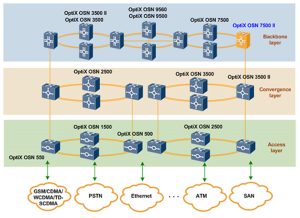
Scusa, nessun allegato disponibile !


